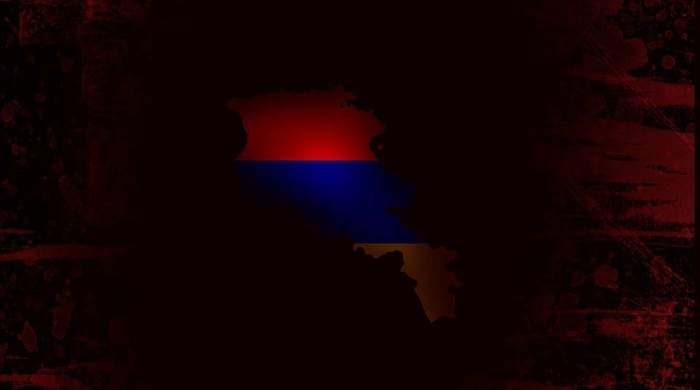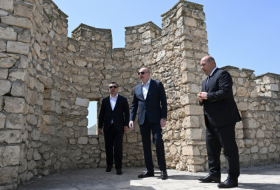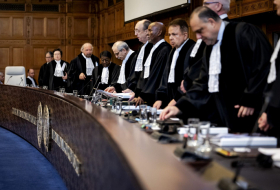International obligations violated by Armenia - REPORT

The report reflects illegal economic activity, relocation to Armenian-occupied Azerbaijani territories and illegal exploitation of natural resources of the country’s Nagorno-Karabakh region.
Violating international law norms Armenia, the well-known country for its aggressive policy towards Azerbaijan, bears responsibility for the illegal economic activity in the occupied territories of Azerbaijan.
AzVision.az presents some extracts from the report on ‘Illegal economic and other activities of Armenian authorities in the occupied territories of Azerbaijan’
Since the late 80s of the XX century, officials of the Armenian SSR put forward territorial claims to Nagorno-Karabakh autonomous region and continued their expansionist policy, violated the Constitution of the USSR. Armenia adopted a number of illegal resolutions on the unilateral annexation of Nagorno-Karabakh region of Azerbaijan to Armenia. All these illegal steps by Armenia lead to military confrontations.
The Republic of Armenia conducted the illegal settlement and economic policy in the occupied territories of Azerbaijan in the early 1990s. Currently, the Republic of Armenia carries out the activities such as the exploitation of possessions, natural and other resources, destruction and illegal trading in this direction without abiding by the international law.The settlement of hundreds of Armenian families from various regions of Armenia and Syria in Azerbaijan is a component of the policy. However, the 49th article of the Geneva Convention IV, which Armenia became a party notes that occupant country cannot settle civilians in the occupied territories.
According to the international law the territories of the countries cannot be changed by force The resolutions of the UN and other international organizations and the decisions of the European Court of Human Rights and other countries reflect the fact that Armenia occupied Azerbaijani lands. The UN Security Council’s resolutions 822 (1993), 853 (1993), 874 (1993) and 884 (1993) criticize the occupation of the Azerbaijani lands by Armenia and confirm the sovereignty and territorial integrity of Azerbaijan within its internationally recognized borders. Moreover, the above-mentioned resolutions demand the immediate, complete and unconditional withdrawal of the Armenian occupying forces from the occupied territories of Azerbaijan.
At the 3525th meeting of the Security Council, held on 26 April 1995, in connection with the Council’s consideration of the item entitled "The situation relating to Nagorno Karabakh", the President of the Security Council made statement on behalf of the Council.
The Council reaffirms all its relevant resolutions, inter alia, on the principles of sovereignty and territorial integrity of all States in the region. It also reaffirms the inviolability of international borders and the inadmissibility of the use of force for the acquisition of territory. Click the LINK
Along with the Security Council, the UN General Assembly has adopted 3 resolutions and a special article on the “Situation in the occupied territories of Azerbaijan”.
United Nations General Assembly Resolution 62/243 dated on March 14, 2008 affirms the respect and support for the sovereignty and territorial integrity of Azerbaijan within its internationally recognized borders, and demands the immediate, complete and unconditional withdrawal of all Armenian forces from all the occupied territories" of Azerbaijan. Furthermore, the resolution reaffirmed the inalienable right of the Azerbaijani population to return to their homes, In this fashion, the necessity of the creation of conditions for their safe return home was highly emphasized.
On 16 June 2015, the Grand Chamber of the European Court of Human Rights announced its judgment (Merits) on the case of Chiragov and others v. Armenia (Application no. 13216/05).
The Court ruled in favor of the applicants, recognizing continuing violations by Armenia of a number of their rights under the Convention for the Protection of Human Rights and Fundamental Freedoms, namely, those relating to the protection of property (Article 1 of Protocol No. 1), the right to respect for private and family life (Article 8 of the Convention) and the right to an effective remedy (Article 13 of the Convention). Furthermore, the judgment effectively put an end to Armenia’s persistent denial of its responsibility for the unlawful occupation of and military presence in the territories of Azerbaijan.
Accordingly, the conclusion must be that due to its initial and continuing aggression against Azerbaijan and military occupation of its internationally recognized territory (Nagorno-Karabakh and the surrounding areas), expulsion of hundreds of thousands of the citizens of Azerbaijan from the occupied territory and the denial of their return to their homes and access to their property in those areas, the Republic of Armenia bears full international responsibility for the breaches of international law that have occurred and continue to occur. A key element of State responsibility, and one particularly significant for present purposes, is the obligation to cease violations, to offer appropriate assurances and guarantees that they will not recur and to provide full reparation for injury. Consequently, Armenia is under the obligation, in the first place, to put an end to the occupation of the territories of Azerbaijan and to withdraw immediately, completely and unconditionally its armed forces from these territories. The implementation of that obligation, which would create necessary conditions for the return of Azerbaijani internally displaced persons, can in no way be considered or introduced as a compromise and, a fortiori, used as a bargaining chip in the conflict settlement process. It is an established principle of general international law that no territorial acquisition resulting from the threat or use of force shall be recognized as legal, as reaffirmed by UN Security Council resolutions 822 (1993), 853 (1993), 874 (1993) and 884 (1993) adopted with regard to the armed conflict in question. This understanding also applies to individual rights and freedoms, the violation of which can in no way produce the outcome that was an initio designed by the perpetrator and that would serve for its benefit.
The Republic of Azerbaijan finds it expedient to remind that serious breaches of obligations under peremptory norms of general international law give rise to additional consequences affecting not only Armenia, but also all other States, which include, inter alia, duties of States to cooperate in order to bring to an end such breaches by lawful means and not to recognize as lawful a situation created by a serious breach, nor render aid or assistance in maintaining that situation. It is therefore critical that the international community insist on the implementation of UN Security Council resolutions 822 (1993), 853 (1993), 874 (1993) and 884 (1993) demanding the withdrawal of the Armenian occupying forces from the occupied territories of Azerbaijan and supporting the return of displaced persons to their places of origin in safety and dignity.
The resolution of the conflict is possible only on the basis of the sovereignty and territorial integrity of Azerbaijan within its internationally recognized borders. The territorial integrity of Azerbaijan has never been and will never be a subject of negotiations. Azerbaijan remains committed to the conflict settlement process based on this understanding. The sooner Armenia reconciles with this reality, the earlier the conflict will be resolved and the countries and peoples in the region will benefit from the prospects of cooperation and economic development`
The UN Security Council’s resolutions that call for the liberation of Azerbaijani territories, the fact that the decision dated June 2015 of the European Court of Human Rights regarding the case known as “Chiragov and others versus Armenia” proves Armenia is in control of Nagorno-Karabakh and surrounding districts.
On 25 January 2005, Council of Europe Parliamentary Assembly (PACE) adopted `Resolution 1416` titled “The conflict over the Nagorno Karabakh region dealt with by the OSCE Minsk Conference”.
In this resolution, the co-signers of PACE reiterate that “considerable parts of the territory of Azerbaijan are still occupied by Armenian forces and separatist forces are still in control of the Nagorno-Karabakh region.” At the same time PACE underlined its concerns about “widespread ethnic hostilities which preceded it, led to large-scale ethnic expulsion and the creation of mono-ethnic areas which resemble the terrible concept of ethnic cleansing“.
`International Covenant on Civil and Political Rights`, `International Covenant on Economic, Social and Cultural Rights`, ` Convention on the Prevention and Punishment of the Crime of Genocide`, ` Convention on the Elimination of All Forms of Racial Discrimination` and `the European Convention on Human Rights` can be applied to the issue of the occupied Azerbaijan lands. Armenia violated the 1954 Hague Convention on “The safeguarding of cultural heritage” by conducting the policy of destruction of cultural heritage in the occupied territories of Azerbaijan. These kinds of facts were confirmed in the reports of the international organizations.
The recommendations that adopted by the UNESCO in 1956 call to avoid the archaeological excavations and the exploitation of natural resources. Moreover, the second protocol of the 1954 Hague Convention dated in 1999 bans the exploitation and carriage of the cultural heritage of the occupied lands. However, Armenia has not fulfilled its obligations. All of the historical and cultural heritage monuments in the occupied lands that were destroyed by Armenians.
The facts reveal that illegal economic and other activities are carried out in the occupied Azerbaijani territories, and Armenia is responsible for organizing them. Armenia plays the role of a transit point in export of goods illegally produced on these territories to international markets. Many facts of building infrastructure facilities on Azerbaijan’s occupied territories are known, in addition, wine, vodka and other products are manufactured there, illegal activities in the field of ICT, banking and so on is carried out.
Unfortunately, the lack of adequate international reaction for the above-mentioned illegal activities and non-fulfillment of international obligations allows to increase impunity and outrage and sustain the expansionist policy.















































